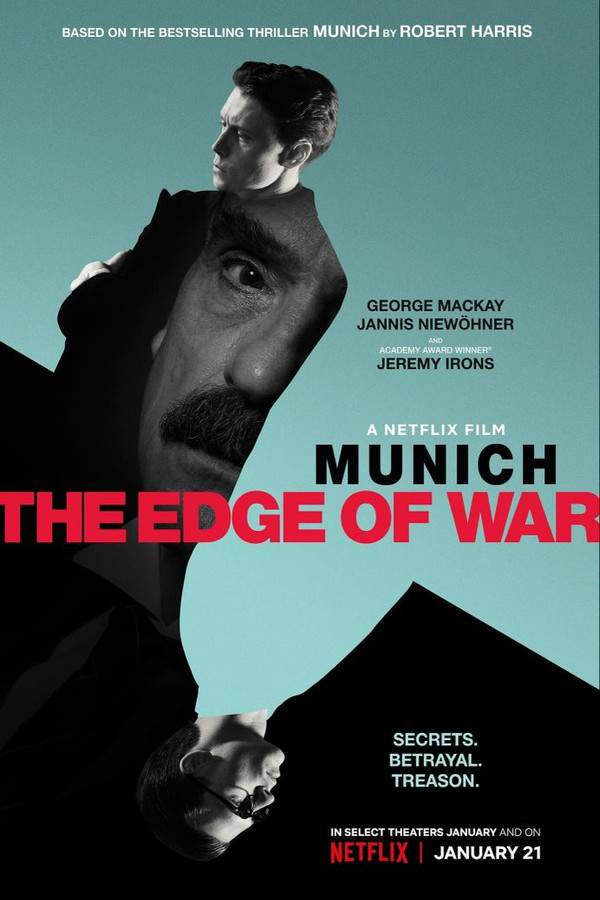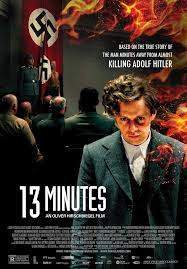
Munich: The Edge of War 2022
Directed by

Christian Schwochow
Made by

Netflix
Test your knowledge of Munich: The Edge of War with our quiz!
Munich: The Edge of War Plot Summary
Read the complete plot summary and ending explained for Munich: The Edge of War (2022). From turning points to emotional moments, uncover what really happened and why it matters.
In 1932, three friends, Hugh Legat, Paul von Hartmann, and his girlfriend Lena (Liv Lisa Fries), gather to celebrate their graduation from Oxford University. Hartmann feels strongly about showcasing the changing landscape of Munich, inviting them to experience the “New Germany.”
Fast forward six years, and Legat is now the secretary to British Prime Minister Neville Chamberlain, amid the looming threat of war in Europe. He is married to Pamela Legat, while Chamberlain is on a desperate quest for peace with Adolf Hitler (Ulrich Matthes), willing to go to great lengths, including conceding the Sudetenland from Czechoslovakia, a nation allied with Britain. However, matters escalate when negotiations fail, as Hitler devises plans to invade the Sudetenland the very next day. Legat works under Sir Osmund Cleverly in the office of the Prime Minister’s Office.
Chamberlain recalls a statement from Hitler showcasing that he considers Mussolini as a confidant. With a fierce determination to avert war, Chamberlain reaches out to Benito Mussolini, pleading for intervention; his efforts momentarily yield results, as Mussolini’s interference prompts Hitler to agree to a Munich conference with Chamberlain and French Prime Minister Édouard Daladier.
Meanwhile, Hartmann operates as a translator in the Foreign Office of Berlin while plotting a coup alongside a Wehrmacht general, intending to arrest Hitler should the generals agree to the bold move. He is torn between his ambitions and doubts about the army’s resolve, knowing that permitting Hitler’s invasion could make a transition of power feasible.
As the conference approaches, Hartmann grows increasingly concerned that Chamberlain might be deceived into sacrificing Sudetenland to stave off war, thus rendering any conspiracy to arrest Hitler futile. He receives a crucial piece of intel from his lover Helen Winter, who provides a stolen document indicating Hitler’s plans to expand his dominion over Europe. Recognizing the urgency, Hartmann and his conspirators agree that they must deliver this information to Chamberlain in Munich before any agreements are finalized. Hartmann suggests his old friend, Legat, as someone who could assist, and soon Sir Horace Wilson and a senior MI6 official enlist Legat’s help to secure the document.
Legat’s memories of a passionate argument with Hartmann over his past support for Nazism linger in his thoughts as he embarks on this risky mission. He convinces Chamberlain to take him along to Munich under the guise of a translator. Once in Munich, Hartmann stealthily conceals the document and a pistol on Hitler’s train, only to encounter Franz Sauer, an SS officer and old acquaintance who grows suspicious of his actions.
Upon their reunion in Munich, Hartmann and Legat navigate their complex past while strategizing about how to present the document’s implications to Chamberlain. However, when they finally meet with the Prime Minister, Chamberlain dismisses their concerns, signing the Munich Agreement shortly after. Hartmann and Legat are left with a vow: Legat will ensure the document reaches London, continuing their fight against the impending war.
Later, Hartmann unveils a tragic tale about Lena—victim to the brutal regime, enduring unspeakable pain after attending an anti-Nazi rally. As tensions intensify, Hartmann’s determination leads him towards an assassination plot against Hitler. However, his brave intentions collide with the harsh realities of espionage and betrayal, especially when Legat’s hotel room is ransacked by Franz.
The political dynamic sharpens when Joan Menzies (Anjli Mohindra), a typist, unknowingly becomes a pivotal character, safeguarding the crucial document from being discovered by Sauer. As Chamberlain returns from Munich basking in the applause, he shares his infamous “Peace for our time” speech, and Legat decides to leave his post to join the RAF as the winds of war draw closer.
Ultimately, the Munich Agreement crumbles just a year later, leading to the outbreak of World War II. Chamberlain resigns in indignation, soon facing death, yet the intelligence extracted from that daring document provides the groundwork for Britain’s eventual triumph in the war.
Munich: The Edge of War Timeline
Follow the complete movie timeline of Munich: The Edge of War (2022) with every major event in chronological order. Great for understanding complex plots and story progression.
Graduation Celebration
In 1932, three friends, Hugh Legat, Paul von Hartmann, and Lena gather to celebrate their graduation from Oxford University. Hartmann expresses a strong desire to showcase the evolving landscape of Munich, hinting at the changes that are about to unfold in Germany.
Legat's New Role
Fast forward to 1938, Hugh Legat finds himself as the secretary to British Prime Minister Neville Chamberlain. This transition occurs amid the escalating threat of war in Europe, demonstrating the increasing tensions on the continent as Germany prepares for its aggressive military maneuvers.
Chamberlain's Quest for Peace
Neville Chamberlain is desperately seeking peace with Adolf Hitler, choosing to concede the Sudetenland from Czechoslovakia, a nation allied with Britain. His determination showcases the precarious balance of diplomacy and the broader implications for Europe during this time.
Escalation of Tensions
As negotiations appear to falter, Hitler devises plans to invade the Sudetenland the very next day, heightening the urgency for Chamberlain and his team. This moment marks a crucial turning point in the political landscape of Europe, foreshadowing the inevitable conflict.
Mussolini's Intervention
Chamberlain reaches out to Benito Mussolini, pleading for intervention in hopes of avoiding war. Mussolini's influence leads to Hitler agreeing to attend a Munich conference with Chamberlain and Édouard Daladier, temporarily alleviating some of the mounting tensions.
Hartmann's Covert Plans
Meanwhile, Paul von Hartmann, now a translator in the Foreign Office of Berlin, plots a coup with a Wehrmacht general. They prepare to arrest Hitler, knowing that the moment is delicate and success hinges upon the army's willingness to act decisively.
Critical Intelligence
Hartmann receives vital intelligence from his lover, Helen Winter, revealing Hitler's intentions to expand his power in Europe. Recognizing the imminent threat, he and his conspirators realize they must inform Chamberlain before any agreements are finalized.
Mission to Munich
Legat is persuaded to assist in delivering the crucial document to Chamberlain in Munich. This mission is fraught with danger as memories of a heated argument with Hartmann about Nazism haunt him, yet he is determined to play his part in averting disaster.
Tense Reunion
Upon arriving in Munich, Legat and Hartmann reunite, navigating the complexities of their past while strategizing. They realize the importance of presenting the document's contents to Chamberlain, mindful of the potential consequences if they fail.
Munich Agreement Signed
Despite their urgent warnings, Chamberlain dismisses the concerns raised by Hartmann and Legat. He signs the Munich Agreement, believing it will keep peace in Europe, while the two friends are left with a promise to continue their fight against the impending war.
Hartmann's Tragic Revelation
Hartmann reveals the heartbreaking story of Lena, who suffered under the brutal Nazi regime after attending an anti-Nazi rally. This event solidifies Hartmann's viewpoint on the necessity of action against Hitler, igniting his determination for an assassination plot.
Betrayal and Espionage
Hartmann's plans begin to unravel as Franz, an SS officer, ransacks Legat's hotel room, intensifying the atmosphere of paranoia and suspicion. This betrayal highlights the dangers they face from within and the desperate stakes involved in their conspiracy.
Joan's Key Role
Joan Menzies, a typist, inadvertently becomes a crucial figure in their plan by safeguarding the important document from Sauer, the SS officer. Her role emphasizes the unexpected ways in which ordinary individuals can impact the course of history during tumultuous times.
Chamberlain's Ignorance
Chamberlain returns from Munich, buoyed by public applause as he delivers his famous 'Peace for our time' speech. Unbeknownst to him, the appeasement will only hasten the approach of war, pushing Legat to leave his position and join the RAF.
Outbreak of World War II
Just a year after the Munich Agreement, World War II erupts, nullifying the fragile peace that Chamberlain sought. His resignation follows amidst criticism, and the intelligence gathered proves crucial for Britain's future efforts in the conflict.
Munich: The Edge of War Characters
Explore all characters from Munich: The Edge of War (2022). Get detailed profiles with their roles, arcs, and key relationships explained.
Hugh Legat (George MacKay)
Hugh Legat is depicted as a pivot between loyalty to his government and friendship. As a secretary to Chamberlain, he faces immense pressure as he balances bureaucratic responsibilities with a moral compass that pushes him toward action. His unwavering resolve reveals both bravery and vulnerability as he navigates dangerous political waters.
Neville Chamberlain (Jeremy Irons)
Chamberlain is portrayed as a well-meaning yet politically naive leader, desperately seeking to maintain peace with Hitler. His conviction in diplomacy showcases his dedication to his country, yet he is ultimately trapped by the harsh realities of geopolitics. His character evolves as he grapples with the consequences of his decisions.
Paul von Hartmann (Jannis Niewöhner)
Paul von Hartmann is characterized as a conflicted figure torn between his loyalty to Germany and the moral imperatives against tyranny. His ambitions collide with the realities of political intrigue, showcasing a deep commitment to thwarting Hitler’s schemes despite overwhelming odds. His relationship with Legat adds depth to his motivations.
Helen Winter (Sandra Hüller)
Helen Winter operates within the shadowy realms of espionage, embodying both strength and vulnerability. Her commitment to aiding the resistance against Nazi oppression marks her as an essential figure in the plot. Her relationship with Hartmann intensifies the stakes as personal and political motivations intertwine.
Munich: The Edge of War Settings
Learn where and when Munich: The Edge of War (2022) takes place. Explore the film’s settings, era, and how they shape the narrative.
Time period
1932-1938
The movie navigates through a critical period leading up to World War II, marked by political instability, rising fascism, and the struggle for power. The Munich Conference in 1938 epitomizes the failed attempts at diplomacy that characterized the era, as leaders sought to avoid war but ultimately contributed to its onset. This time was fraught with tension as different factions plotted and made alliances, culminating in significant events that would alter the course of history.
Location
Munich, Berlin, Czechoslovakia
Munich, known as a cultural hub in Germany, is where most of the crucial political maneuvering takes place, symbolizing the conflict of the era. Berlin serves as a contrasting backdrop, representing the heart of the Nazi regime with its oppressive atmosphere. Czechoslovakia, particularly the Sudetenland, is pivotal as it becomes the focal point for the political tension and the fears of a looming war.
Munich: The Edge of War Themes
Discover the main themes in Munich: The Edge of War (2022). Analyze the deeper meanings, emotional layers, and social commentary behind the film.
🕊️
Peace and Conflict
At the heart of the film is the theme of peace amidst escalating conflict, as characters grapple with choices that could avert or lead to war. Chamberlain’s desperate attempts to secure peace illustrate the complexities of diplomacy faced by nations on the brink of war. However, the film ultimately questions the effectiveness of such efforts when confronting tyrannical ambitions.
🕵️♂️
Espionage
The narrative deeply explores espionage, focusing on the clandestine efforts to confront Hitler’s plans. Characters engage in covert actions, driven by allegiance and urgency, to sway the course of national destiny. These elements convey the risks taken by individuals attempting to change the tide of impending war, emphasizing the moral dilemmas within the realm of intelligence.
💔
Sacrifice
Sacrifice resonates throughout the story as characters make significant personal and ethical compromises in the face of national duty. Hartmann’s internal struggle reflects his dedication to a cause greater than himself, even at the cost of personal relationships. The theme culminates in the realization that fighting for freedom might demand unimaginable sacrifices.

Coming soon on iOS and Android
The Plot Explained Mobile App
From blockbusters to hidden gems — dive into movie stories anytime, anywhere. Save your favorites, discover plots faster, and never miss a twist again.
Sign up to be the first to know when we launch. Your email stays private — always.
Munich: The Edge of War Ending Explained
Unravel the ending of Munich: The Edge of War (2022) with our detailed explanation. Understand the final scenes, character fates, and unresolved questions.
At the end of “Munich: The Edge of War,” the true consequences of the characters’ choices and the brutal reality of that historical moment become very clear. Paul Von Hartman, who initially believed in Hitler’s promises, undergoes a profound transformation after witnessing the horrors inflicted on Lena, his Jewish girlfriend, and after uncovering evidence proving Hitler’s true intentions. Despite his efforts to prevent the Munich treaty by revealing this information to the British government, he ultimately fails to stop it. The treaty, which was supposed to avert war by ceding the Sudetenland to Germany, only temporarily delays the inevitable. Within a year, Hitler breaks the agreement, invading Poland and igniting World War II.
The film shows how political appeasement, motivated by a desire to avoid conflict, can embolden tyrants rather than tame them. Neville Chamberlain’s strategy of diplomatic negotiation buys time but ultimately enables Hitler’s expansionist ambitions. Meanwhile, Hitler is portrayed as a manipulative leader who conceals his true motives behind propaganda, only to reveal his ruthlessness once he feels secure enough to act.
In the final scenes, Hitler’s discontent and the aftermath of the Munich agreement are palpable. He is furious that Chamberlain received credit for “peace,” while he saw it as a betrayal and a temporary victory for his plans of conquest. The film emphasizes that totalitarian regimes thrive on control of perceptions and that their real agendas remain hidden behind layers of deception.
A key message of the story is a reflection on human nature—how often people prefer to turn a blind eye to injustices until they are personally affected. Paul’s moral journey underscores that true resistance often comes too late and that moral courage is difficult to summon when one isn’t directly impacted by oppression. The ending leaves viewers contemplating the tragic cost of political complacency, the importance of foresight, and the dangers of appeasement in the face of evil. Ultimately, it’s a sobering reminder that history can repeat itself when human beings fail to recognize and challenge tyranny early enough. The film closes on the somber realization that the world narrowly escaped disaster, but only through the sacrifice of truth and moral conviction.
Munich: The Edge of War Spoiler-Free Summary
Discover the spoiler-free summary of Munich: The Edge of War (2022). Get a concise overview without any spoilers.
In the crisp autumn of 1938, Europe teeters on the edge of catastrophe. Diplomats, politicians, and secretaries converge on the Bavarian city of Munich, a glittering backdrop to a fragile peace that feels increasingly like a house of cards. The atmosphere crackles with nervous anticipation, as every conversation carries the weight of nations and the hum of looming conflict. The film paints this moment with a muted, tension‑filled palette, inviting viewers to feel the cold wind of history pressing against the doors of power.
At the heart of the story is Hugh Legat, a diligent British civil servant tasked with navigating the treacherous waters of high‑level negotiations. Across the table stands Paul von Hartmann, a polished German diplomat whose charm masks a deep internal struggle. Though years have passed since their days at Oxford, the two men share a bond forged in youth, now tested by the stark realities of their divergent loyalties. Their reunion in Munich becomes a quiet focal point, a personal thread woven through the broader tapestry of impending war.
The tone blends the measured restraint of a political thriller with the intimate intensity of a friendship on trial. Conversations are layered with subtext, and every glance hints at unspoken histories and conflicting duties. The film’s pacing allows the audience to linger on the subtle gestures that reveal character—Legat’s polished professionalism, Hartmann’s conflicted poise—while the ominous, rain‑slick streets of Munich echo the broader dread outside the conference halls.
Against this charged backdrop, both men must confront what it means to serve their countries when the cost of peace may be far greater than any treaty. Their personal stakes are as high as the continent’s, and the story promises a delicate dance of diplomacy, conscience, and the fragile hope that old friendships might still light a path through the gathering darkness.
Can’t find your movie? Request a summary here.
Movies with Similar Twists and Themes
Uncover films that echo the narrative beats, emotional arcs, or dramatic twists of the one you're exploring. These recommendations are handpicked based on story depth, thematic resonance, and spoiler-worthy moments — perfect for fans who crave more of the same intrigue.
Featured on this page

What's After the Movie?
Not sure whether to stay after the credits? Find out!
Explore Our Movie Platform
New Movie Releases (2025)
Famous Movie Actors
Top Film Production Studios
Movie Plot Summaries & Endings
Major Movie Awards & Winners
Best Concert Films & Music Documentaries
Movie Collections and Curated Lists
© 2025 What's After the Movie. All rights reserved.












